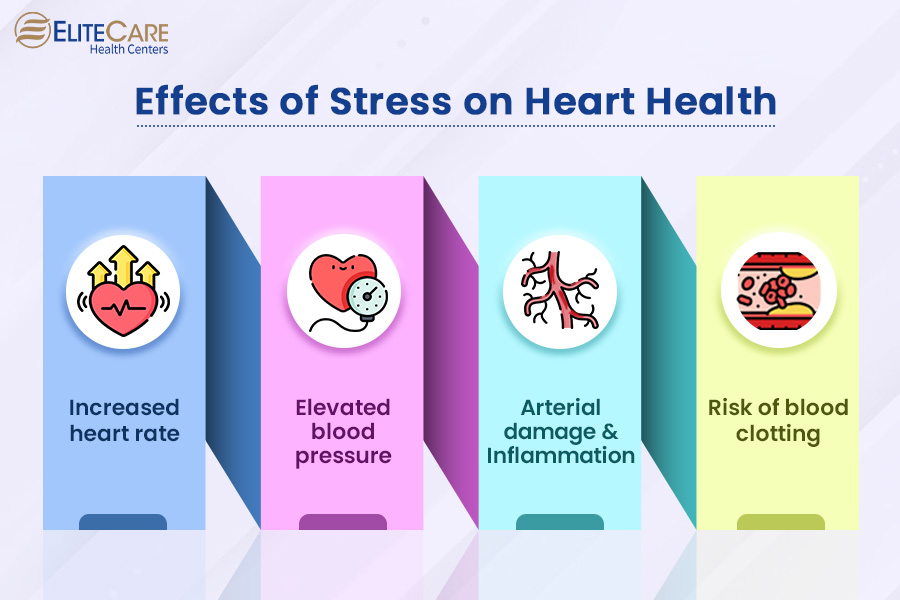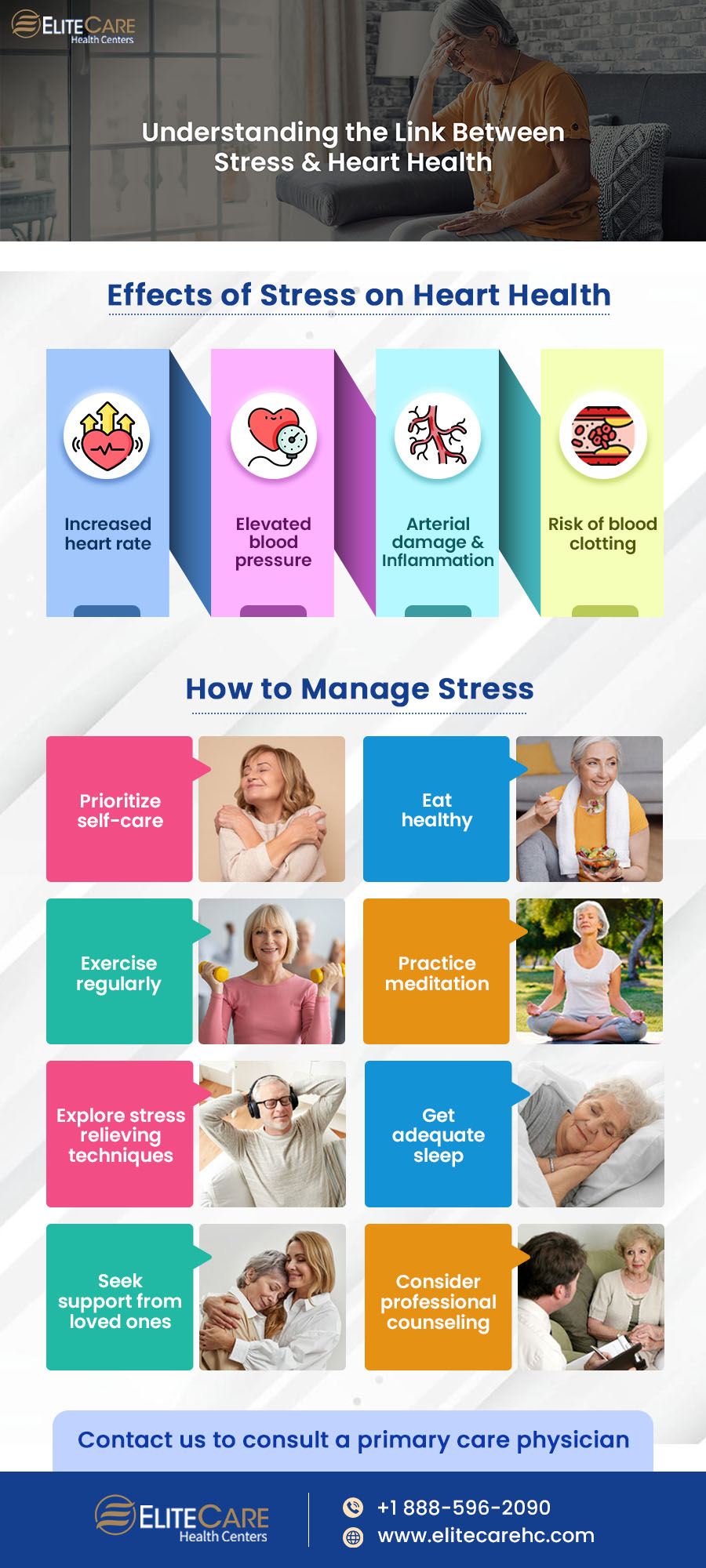
In this fast-paced and competitive world, stress has become a constant companion in our daily lives. Beyond its immediate impact on our mental well-being, stress can also take a significant toll on our physical health, particularly our cardiovascular system.
In this blog post, we will share insights into stress and how it can contribute to heart disease. Read on to learn more.
Understanding Stress & Its Impact
Stress occurs when the body naturally responds to any demand or threat, whether real or perceived. It is a natural physiological and psychological reaction that works like an alarm system to help us prepare for challenging situations. When we are stressed, our bodies release hormones, such as cortisol and adrenaline, triggering a series of responses that can help us cope with the threat.
Physically, stress can cause a faster heartbeat and rapid breathing. Mentally, stress can make us anxious, worried, or overwhelmed, eventually affecting our concentration, memory, and decision-making abilities.
Different Types of Stress
While stress is a normal part of life, prolonged or excessive stress can affect our health significantly. The following are the three types of stress that can affect our physical and mental well-being:
Acute stress
It is the most common type of stress and is typically short-term. It is a response to immediate challenges or pressures, such as an upcoming deadline or a sudden unfortunate incident.
Episodic acute stress
When individuals experience frequent episodes of acute stress, it is known as episodic acute stress. In this type of stress, individuals often find themselves caught in a cycle of constant stress, bouncing from one crisis to another. This chronic pattern of acute stress can have serious health consequences.
Chronic stress
It refers to a prolonged or ongoing state of stress that persists over an extended period. Chronic stress often results from continuous exposure to stressors, such as work pressures, financial difficulties, etc. This type of stress can be particularly harmful, as the body remains in a constant state of heightened alertness.
Effects of Stress on Heart Health

Researchers and healthcare professionals have recognized stress as a major risk factor behind the development and progression of heart disease. The negative effects of chronic and acute episodic stress on heart health are as follows:
1. Increased heart rate
In a stressful situation, our brain signals the release of stress hormones, such as adrenaline and noradrenaline. These hormones activate the sympathetic nervous system responsible for the ‘fight-or-flight’ response, where we decide whether to confront a stressful situation or escape it.
Activation of the sympathetic nervous system stimulates the heart by releasing more adrenaline. Adrenaline acts on specialized receptors in the heart, causing it to beat faster and more forcefully.
Additionally, stress can influence the electrical signals within the heart, potentially causing disruptions in the normal heart rhythm. It can lead to irregular heartbeats, known as arrhythmias, which may manifest as palpitations, rapid heartbeat, or skipped beats. Arrhythmias can interfere with blood circulation, potentially risking overall heart health.
2. Elevated blood pressure
Stress hormones also cause blood vessels to constrict or narrow. This constriction is a result of the activation of alpha-adrenergic receptors in the blood vessel walls. When blood vessels constrict, the resistance to blood flow increases, leading to elevated blood pressure.
Besides, stress can also stimulate the release of another hormone called cortisol which prompts the body to retain sodium and water, eventually increasing blood volume. Higher blood volume further contributes to elevated blood pressure.
A study published in the Journal Psychosomatic Medicine found that individuals with high levels of perceived stress had a 34% higher risk of developing hypertension.
3. Inflammation and arterial damage
Stress hormones can activate the immune system, which is the body’s natural defense mechanism against potential threats. However, prolonged or chronic stress can alert the immune system frequently, eventually leading to low-grade inflammation throughout the body.
Chronic inflammation can damage the inner lining of blood vessels and promote the accumulation of cholesterol, immune cells, and other substances within the arterial walls. It eventually results in atherosclerosis, a condition characterized by the buildup of plaque within the arteries.
As the plaques grow and harden, they can restrict blood flow to the heart muscle, leading to various forms of heart disease, such as coronary artery disease, angina (chest pain), heart attacks, or heart failure. If a plaque ruptures, it can trigger the formation of blood clots, further obstructing blood flow and potentially causing a heart attack or stroke.
4. Risk of blood clotting
Stress hormones can also activate the coagulation system, which is responsible for blood clotting. This activation is part of the body’s response to potential injury or bleeding. Prolonged stress can promote the formation of blood clots within the blood vessels and increase the risk of heart disease.
In addition, chronic stress may interfere with fibrinolysis- the process by which the body dissolves blood clots to prevent them from becoming too large or causing blockages. When fibrinolysis gets disrupted, it can impair the body’s ability to break down blood clots effectively, eventually leading to a stroke or heart attack.
How to Manage Stress

In addition to the breathing techniques, individuals can incorporate the following exercises for more effective results:
1. Prioritize self-care
Make self-care a priority and dedicate time to activities that bring joy and relaxation, such as engaging in hobbies, spending time in nature, reading, or listening to music. Taking care of both mental and emotional well-being is crucial for effective stress management.
2. Eat healthy
Adopt a balanced diet by incorporating nutritious foods like fruits, vegetables, whole grains, lean proteins, and healthy fats into your meals. Do not consume processed foods, sugary snacks, and caffeine excessively, as they can exacerbate stress symptoms.
3. Exercise regularly
Engage in regular physical activity and spend at least 30 minutes practicing moderate-intensity exercise. Physical activities help release endorphins that improve mood and help combat stress.
4. Practice mindfulness and meditation
Incorporate mindfulness and meditation into the daily routine. Start with short periods of meditation or use mindfulness apps or guided meditations to develop a personalized plan.

5. Practice stress-relieving techniques
Explore different stress-relieving techniques including deep breathing exercises, progressive muscle relaxation, guided imagery, journaling, or engaging in creative outlets like painting or playing a musical instrument. Individuals should experiment with various techniques to discover which ones work best for them.
6. Get adequate sleep
Prioritize good quality sleep to allow the body and the mind to recharge. It is crucial to create a comfortable sleep environment, follow a consistent routine for going to bed and waking up, and practice relaxation techniques before bed. Get at least 7-9 hours of deep, uninterrupted sleep each night and manage stress effectively.
7. Foster supportive relationships
Individuals should surround themselves with positive, supportive individuals who uplift them and stay connected with loved ones to share thoughts and feelings.
8. Seek professional support
In case of acute episodic stress or chronic stress, consider seeking professional help. Mental health professionals can provide guidance, therapy, or stress management techniques tailored to individual needs.
Everyone’s journey with stress management is unique. Therefore, individuals should explore different strategies to manage stress and be patient with themselves to find what works best for them.
The Bottom Line
The American Heart Association reports that chronic stress is associated with a 40% higher risk of developing heart disease or having a heart attack. Therefore, it is crucial to manage stress to reduce the risk of heart disease. Individuals need to find the stressors that trigger stress. It will help them understand stress patterns better and empower them to develop strategies to manage stress effectively.
For any queries or concerns about heart health or stress management, contact EliteCare Health Center, one of the best medical clinics in Florida, specializing in senior care services.






